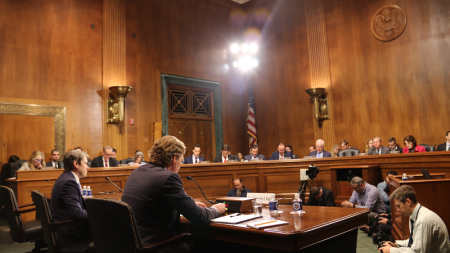
While telecommunications providers in the United States prepare to rip out and replace gear from China-based Huawei and the United Kingdom has moved to eventually ban the company’s equipment from its 5G networks, the German government has officially stated its neutrality in the matter.
“The federal government is pursuing an approach that is neutral,” said Daniela Brönstrup, Germany’s deputy director-general in the Ministry of Economic Affairs and Energy, “neutral with regard to manufacturers and technologies.”
Alongside that neutrality stance, however, the government official said that Germany is also investigating whether Open Radio Access Networks (Open RAN) can be a viable alternative to proprietary equipment such as those sold by Huawei.

In previous generations of wireless technology, one manufacturer would provide the radios, hardware, and software in a “closed proprietary solution” at a RAN cell site. Huawei, Sweden-based Ericsson, and Finland-based Nokia have been the three major vendors in the RAN space, according to a 2018 study from the Center of Strategic & International Studies (CSIS).
Those promoting Open RAN, like the big tech companies in the Open RAN Policy Coalition, say they want to be able diversify the component elements in the RAN to drive innovation and competition as the next generations of wireless networks are deployed.
“We think, as the Japanese do, that Open RAN, for example, is a very good topic we should have a closer look to, we are doing that,” said Brönstrup, during an online event on July 30 hosted by the Telecommunications Industry Association (TIA). She said there is an Open RAN pilot project in Berlin that provides “chances” for participation by small and medium-sized companies.
Legislative Options on Open RAN
Sen. Mark Warner, D-Va., speaking at an event last month, said Open RAN “gives a great opportunity for the West writ large and American companies, in particular, to compete on a very successful basis against Huawei going forward.”
A provision backed by Sen. Warner to increase funding for research and development for Open RAN technologies is in the Senate’s National Defense Authorization Act (NDAA) legislation approved earlier this month. The provision also allocates funding towards collaborating with international partners to promote open standards. Sen. Warner called for more financial resources for the provision during the event last month.
A bipartisan group of House members introduced similar legislation earlier this year.
Amb. Robert Strayer, deputy assistant Secretary of State for cyber and international communications policy, said it might take a few years to create “a truly open architecture set of standards and interoperability that’s well defined and easily tested and evaluated.”
“There is tremendous promise and great opportunity in open architecture environments,” said Strayer, speaking during the same July 30 TIA event as Germany’s Brönstrup.

Possibility for Partnership
Strayer said that the “tide is turning against Huawei,” while Brönstrup did not comment directly on the Chinese company. “I’m happy to say that we, of course, would like to cooperate much more with our Japanese and U.S. partners,” she said.
Japan’s representative at the TIA event promoted his government’s strategy, published last month, called “Beyond 5G,” which touts open network architecture
“We believe that to realize ‘Beyond 5G,’ promotion of network virtualization and open architecture based on experience of 5G is essential,” said Eiji Makiguchi, Japan’s director-general of the Global Strategy Bureau in the Ministry of Internal Affairs and Communications. He previewed an upcoming international conference to be held by Japan to promote international cooperation in telecommunications.
